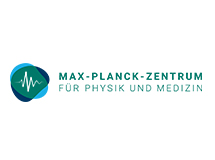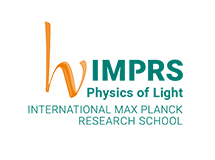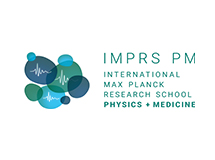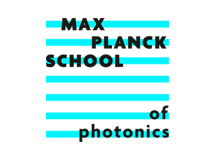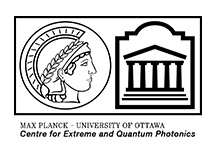Bavarian Health Minister promotes innovative project on Long Covid with more than one million euros
During a visit to the Universitätsklinikum Erlangen, Minister Klaus Holetschek handed over the funding notification for the project "disCOVer (diagnosis Long-COVID Erlangen). The aim of the project is to reliably diagnose three forms of long-term consequences of an infection with SARS-CoV-2 with the help of artificial intelligence and then to optimally treat those affected. The Department of Biological Optomechanics of the Max Planck Institute for the Science of Light is significantly involved.
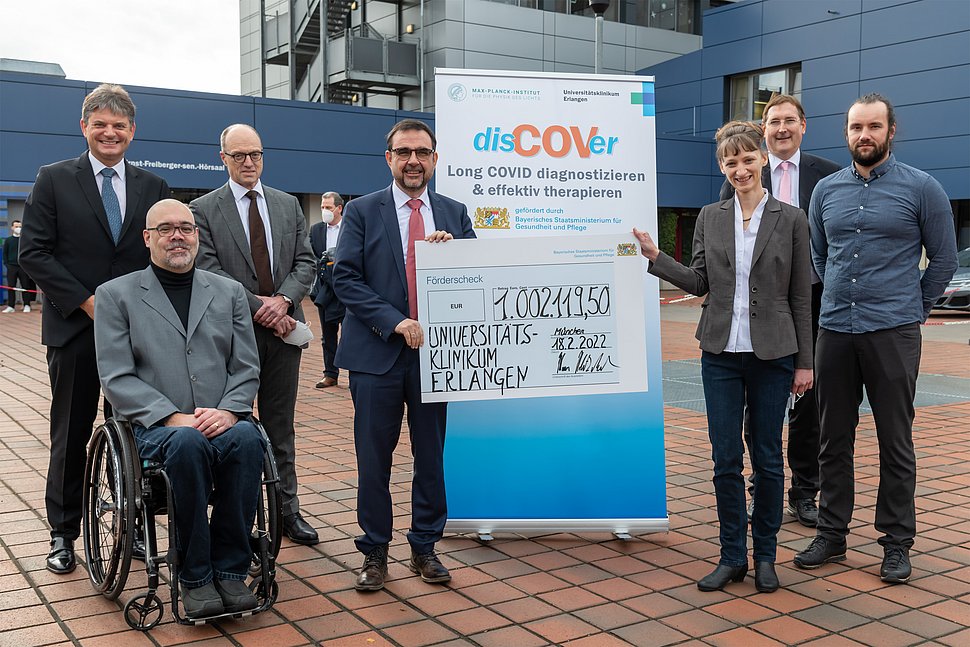
Photo: Michael Rabenstein/Uni-Klinikum Erlangen (1)
Bavaria's Minister of Health Klaus Holetschek is pushing ahead with research into the late effects of corona diseases. On the occasion of the handing over of a grant to the Universitätsklinikum Erlangen, Holetschek said on Friday: "About ten percent of all adults suffering from COVID-19 struggle with the late effects. The symptoms include headaches, concentration problems and exhaustion. Diagnostic possibilities are still lacking, and treatment is based on the symptoms. This is where the promising project of the Universitätsklinikum Erlangen comes in, which aims to diagnose and successfully treat Long-COVID. We are funding it with more than one million euros."
The goal of the model project "disCOVer" (diagnosis Long-COVID Erlangen) is to diagnose three Long COVID subtypes with the help of a medical history and innovative medical diagnostics. Then, from a total of three forms of therapy, the one that best suits the Long COVID patients individually and promises the greatest possible therapeutic success is to be selected.
Holetschek explained: "The project can be considered unique in the whole of Germany, because for the first time an objective diagnosis of Long COVID will be made. If the project is successful, it will represent a milestone in the treatment of Long COVID and Post COVID Syndrome. In addition, patients will be treated specifically and - for the first time in Germany - based on the cause of the disease, no longer just symptom-oriented."
Experimental and established approaches will be combined for this purpose. State-of-the-art equipment is also used, for example in determining the physical properties of blood cells. And artificial intelligence (AI) helps with the identification of patterns and systematic abnormalities, for example.
Three therapy pathways
The Department of Biological Optomechanics at the Max Planck Institute for the Science of Light (MPL) in Erlangen plays a key role in the development of innovative methods for the diagnosis of Long COVID within the disCOVer project. The researchers led by director Jochen Guck and postdoc Martin Kräter have developed a method called real-time deformability cytometry, which can be used to measure the physical properties of up to a thousand blood cells per second. The measurement data is then analysed using machine learning methods. These AI algorithms should make it possible to distinguish between the three postulated Long COVID subtypes.
Guck explained: "Our initial study results are very promising. The cooperation with care centres throughout Bavaria helps us to further develop real-time deformation cytometry into a routine diagnostic procedure." In parallel, the scientists are working with partners to scale down measurement and evaluation procedures. The goal: a device that can one day be found in every doctor's office and reliably support the diagnosis of Long COVID.
Assistant Professor Dr. Dr. Bettina Hohberger from the Universitätsklinikum Erlangen said: "We are very grateful for this generous funding so that we can establish model care for the diagnosis and therapy of Long COVID patients on a scientific basis that will directly benefit many Long COVID patients."
The diagnosis will be made in Erlangen and at five decentralised locations throughout Bavaria. The data will then be evaluated centrally at the Universitätsklinikum Erlangen. In the third step, patients will be assigned to one of three defined therapy pathways. The therapy paths are:
1. rehabilitation in one of two specialised rehabilitation clinics (Klinik Bad Wörishofen, specialised clinic for cardiovascular diseases and orthopaedics and the m&i-Fachklinik Herzogenaurach, specialised clinic for specialised acute medicine and medical rehabilitation).
2. booster vaccination with one of the currently available mRNA vaccines
3. neutralisation of autoantibodies by e.g. BC 007
Minister Holetschek underlined: "The knowledge gained from the project should lay the foundation for a nationwide care of patients."
In addition to the project management by the Universitätsklinikum Erlangen, the Max Planck Institute for the Science of Light, the Max-Planck-Zentrum für Physik und Medizin, the Helmholtz Zentrum München, five other decentralised locations in Bavaria as well as rehabilitation facilities are involved in the project.
The project is funded within the framework of the initiative "Care Research on Post COVID Syndrome", which the state government launched in June 2021 with a volume of five million euros to improve the care of post COVID patients. The project runs from 01.12.2021 to 31.12.2022. The funding initiative of the Free State of Bavaria closes a gap in previous nationwide research and complements a federal funding programme for general scientific research into post COVID syndrome.
One of the projects funded by the Federal Ministry of Education and Research is a pilot study at the Universitätsklinikum Erlangen. It is investigating the presence of autoantibodies in the blood of long-COVID patients and their effect on blood circulation in the finest vessels. One possible therapeutic approach is the substance BC 007, which binds and neutralises autoantibodies. The first curative trials with BC 007 in Long COVID have already been successfully carried out.
Minister Holetschek emphasised: "The project 'disCOVer', which we are funding, is the ideal complement to the project funded by the federal government. It bridges the gap between basic research and direct application: The active substance BC 007 is used in one of the three therapies."
(1) Symbolic hand-over of a cheque for the disCOVer project with Prof. Joachim Hornegger, President FAU; MPL Director Jochen Guck, Prof. Heinrich Iro, Medical Director Universitätsklinikum Erlangen; Klaus Holetschek, Bavarian Health Minister; Assistant Professor Bettina Hohberger, Universitätsklinikum Erlangen; Prof. Markus F. Neurath, Dean Medical Department FAU; Martn Kräter, Postdoc MPL.
More information for patients: www.discover-erlangen.de
Contact
Edda Fischer
Head of Communication and Marketing
Phone: +49 (0)9131 7133 805
MPLpresse@mpl.mpg.de

